Dear Friends,
Issues surrounding the COVID-19 global pandemic remain foremost in the minds of lawmakers. We continue to monitor the situation closely and will act swiftly as necessary to support our health care systems and Minnesotans affected by the corona virus outbreak. The health and safety of Minnesotans is our top priority.
I have spent the past week on phone calls and conference calls and other means of communication with government officials from the White House, the Walz Administration, our Legislature, Hennepin County, local officials from Plymouth and Minnetonka, each of the five Superintendents from the school districts in Senate District 44, School Board Members, Parents, and many business owners and employees who have been drastically impacted by the pandemic.
These are trying times but I am confident that by continuing to work together, and taking things day-by-day, we will get through this together.
Please take a few minutes to read an update on what the Legislature is doing to combat COVID-19 and other highlights from the week of March 9, which at this point seems like a lifetime ago.
COVID-19 Emergency Funding
Earlier this week, the Legislature unanimously passed additional emergency funding to help fight the outbreak, and the Legislature has altered operations on the advice of public health experts to help mitigate the outbreak and slow transmission of the virus.
$200 million was in the bill to fund the state healthcare system’s needs for hospitals, eldercare facilities, EMS, clinics, and pharmacies responding to COVID-19 cases. Representatives from key areas weighed in and national recommendations were considered during the process. The bill passed with unanimous support from the Senate and the House.
After an initial funding approval of $21 million last week, the new legislation provides $50 million to nursing homes, long-term care centers, paramedics, and other health care facilities and teams.
Our healthcare system is one of the best in the nation because of dedicated people committed to providing excellent care to their fellow Minnesotans. With this funding, we are simply getting them the critical tools they need to do what they do best. As the number of hospitalizations begin to ramp up, I remain incredibly grateful for their continued care.
The bill also develops an oversight board to advise the Minnesota Department of Health of statewide needs, and no one without insurance will be charged for COVID-19 screening, testing, or treatment in facilities that use the funds.
The Senate’s plan is to assist key individuals who may contract COVID-19 as they care for people with the disease through screening, testing, and treatment. The funds can be used to purchase personal protection supplies to prevent the spread of the corona virus, renovate rooms into specialty care, or purchase life-saving equipment. The dollars give facilities flexibility to be used for supplies or equipment, and there are accountability measures in place so they are only used for COVID-19 related costs.
COVID-19 Legislature working by alternative means outside of the Capitol
This past Sunday evening, legislative leaders reached an agreement to continue to work over the next few weeks, but by alternative means in the wake of COVID-19. The Legislature expects to operate efficiently and safely to aid Minnesotans with COVID-19 preparedness and response, and to continue our work to address other pressing needs of the state.
The Legislative bodies and committees will meet in floor and committee session on an on-call basis through April 14. This means there will not be standing floor and committee meetings, but we will meet in the House and Senate Chambers and in committees with advance notice to members and to the public.
As all Minnesotans are asked to responsibly follow guidelines from the Center for Disease Control and the Minnesota Department of Health, the Legislature is altering our schedule to prioritize community health at this time. My colleagues and I are committed and ready to act swiftly as needed to provide support to Minnesotans during this time.
The Capitol and Senate office building will generally be closed to the public, but phone and individual meetings will still take place by appointment. At this time, the Senate plans to return to normal activity on April 14 to conduct important business before the constitutional adjournment date of May 18, 2020.
As the COVID-19 virus unfolds in Minnesota, there are several resources that individuals can use to stay up to date on the latest information:
MDH’s COVID-19 page: https://www.health.state.mn.us/diseases/coronavirus/index.html
MDH’s COVID-19 prevention tips: https://www.health.state.mn.us/diseases/coronavirus/prevention.html
MDH’s COVID-19 Situation Update: https://www.health.state.mn.us/diseases/coronavirus/situation.html
Mayo Clinic’s COVID-19 page: https://www.mayoclinic.org/diseases-conditions/coronavirus/symptoms-causes/syc-20479963
CDC COVID-19 page: https://www.cdc.gov/coronavirus/2019-ncov/index.html
CDC COVID-19 Frequently Asked Questions: https://www.cdc.gov/coronavirus/2019-ncov/faq.html
Insulin Reform
After more months of discussion, analysis, and debate, the Senate passed a strong insulin safety net bill with a unanimous vote. This program is designed to be available for all who need it and includes fulfillment of both urgent and ongoing needs for patients.
Most importantly, this bill provides 30 days of emergency insulin to anyone regardless of income as long as they are Minnesota residents and in need of the medicine. All insulin in the Senate plan is provided by the insulin companies with affordable co-pays. A long-term component to the program helps patients afford their insulin with a 90-day supply for no more than a $25 co-pay.
The cost of insulin reached an absurd level and required action from the legislature. We took action on behalf of those who depend on this lifesaving medication. This was a top priority heading into session and I am happy that this passed unanimously.
The Senate bill heads to a conference committee with the House bill and fully expect that prior to the end of the 2020 Legislative Session, we will have a compromise bill that will cover all Minnesotans in need.
Higher Education Finance and Policy
Last week, we heard updates from the University of Minnesota, the Minnesota State Systems, and the Minnesota Private Colleges on how they are preparing for the COVID-19 outbreak. This was hours prior to the decision by University of Minnesota President Joan Gabel to close campuses and move to an eLearning model for the foreseeable future. The next morning, Minnesota State Chancelor Devinder Malhotra, made the same decision.
We are assured that our Higher Education system is taking appropriate steps to protect the health and well-being of students and faculty. I am also confident the measures they are taking will contribute to the public health efforts to mitigate the virus outbreak and its effects. 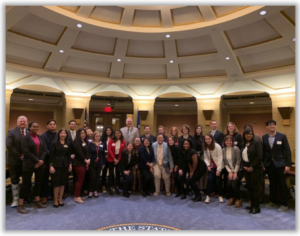 One of the most gratifying aspects of this job is hearing first-hand the positive impact of policy on the lives of Minnesotans – especially the leaders of tomorrow. Last Tuesday, March 10, we heard an update from the Office of Higher Education on the State Grant program. Following the report, we heard from students from across Minnesota who provided first-hand testimony of how their lives have been positively impacted by this financial support.
One of the most gratifying aspects of this job is hearing first-hand the positive impact of policy on the lives of Minnesotans – especially the leaders of tomorrow. Last Tuesday, March 10, we heard an update from the Office of Higher Education on the State Grant program. Following the report, we heard from students from across Minnesota who provided first-hand testimony of how their lives have been positively impacted by this financial support.
Last Thursday, March 12, I presented my bill, Senate File 3683, on behalf of the Minnesota Office of Higher Education.
This is a bipartisan agency bill which brings forward a 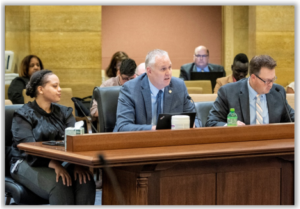 proposal that implements important technical changes and policy priorities like increasing FAFSA completion, and ensuring the inclusion of tribal communities.
proposal that implements important technical changes and policy priorities like increasing FAFSA completion, and ensuring the inclusion of tribal communities.
The bill makes several technical changes to Higher Ed statutes to ensure that the law is operating as intended. The work of finding and correcting small problems in statute may not be the most exciting work we do in the Higher Education committee, but it is important to ensure the proper administration of the programs we fund.
Taxes Committee
Last week I presented a bill to the Senate Tax Committee on behalf of the city of Minnetonka. Senate File 3932 builds on a bill I carried last year which was passed and signed into law, Senate File 442. Joining me to testify were Minnetonka Police Chief Scott Boerboom, Minnetonka Fire Chief John Vance, and Minnetonka Assistant City Manager Mike Funk.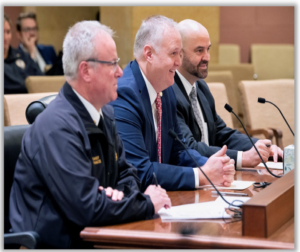 Last year’s bill which was passed into law provides a sales tax exemption for materials and supplies used in, and equipment incorporated into, the construction of a new fire station in the City of Minnetonka and the remodeling and expansion of the existing police and fire station to accommodate the police department’s needs.
Last year’s bill which was passed into law provides a sales tax exemption for materials and supplies used in, and equipment incorporated into, the construction of a new fire station in the City of Minnetonka and the remodeling and expansion of the existing police and fire station to accommodate the police department’s needs.
The exemption was originally authorized until January 1, 2021. However, original construction bids for the project received in May 2019 far exceeded the City’s estimate. The City Council rejected the bids and authorized the construction manager/contractor process.
In July 2019, the City hired Kraus Anderson and began to review the project’s scope. This past October the project was successfully rebid in line with the revised estimate. With the delay to rebid — and with an estimated 18-month construction timeline — the project is now estimated to be completed in the fall of 2021. It’s estimated that 60% of the purchases will occur after January 1, 2021 – which is beyond the expiration date of the exemption in the bill from last session.
Senate File 3932 simply extends the exemption period one year from January 1, 2021 – to January 1, 2022 – to accommodate the revised project timeline.
Sober Home Studies Bill
Last week I appeared before the Human Services Reform Finance and Policy committee to present my bill, Senate File 3577, which would require the Department of Human Services (DHS) to study baseline standards in the operation of sober homes in Minnesota. 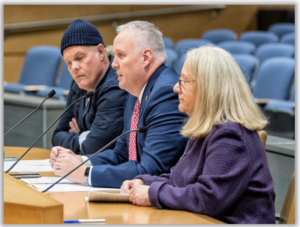 There are many outstanding and quality sober homes operating in Minnesota providing people in recovery a safe and supportive space as they continue their journey to recovery.
There are many outstanding and quality sober homes operating in Minnesota providing people in recovery a safe and supportive space as they continue their journey to recovery.
Recently, however, there have been complaints about unsanitary conditions, high costs, and people being discharged in the middle of the night following a rule violation from certain sober home facilities in Minnesota.
Sober homes are currently unregulated, and there is no formal process to submit complaints to a government agency. As the sober home model expands–and new providers enter the market–it’s a good time to bring together key stakeholders and have a conversation about what oversight in this area would look like.
I want to thank the National Alliance on Mental Illness (NAMI) Minnesota and the Minnesota Association of Sober Homes (M.A.S.H.) for working together on this bill and for joining me to provide testimony.
One of the highlights of representing the communities of Plymouth, Minnetonka and Woodland, is meeting with constituents, hearing what’s important to them, and working on behalf of them and their families. Here is a just a small number of the constituents who I met with last week in St. Paul.
Constituent Visits
Constituents and representatives from the Minnesota Retailers Association stopped by for a meeting on Tuesday during their annual lobby day on the Hill.
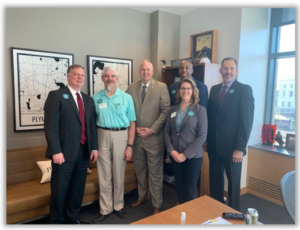 With one in four jobs in Minnesota directly connected to retail, it was great to discuss their priorities and the impact current legislation being discussed at the Legislature would have on the industry.
With one in four jobs in Minnesota directly connected to retail, it was great to discuss their priorities and the impact current legislation being discussed at the Legislature would have on the industry.
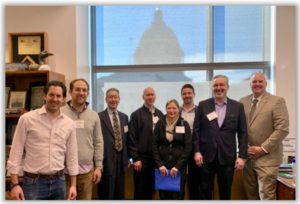
Constituents representing restaurants and businesses involved with Hospitality Minnesota visited my office on Tuesday, March 10, to share their business insights, challenges and experiences. They also shared theirperspectives on policies being debated at the Capitol, including: workforce, environmental issues, tax issues, budget issues and fair market standards.
Later that same week, these same folks would receive the news that according to Governor Walz’s Executive Order, bars and restaurants would be closed aside from takeout and curbside pickup. Please do your best when possible to support your local restaurants and employees who are still working during these challenging times.

On Tuesday, March 10, it was a pleasure to be able to visit with Kathryn (Plymouth) about her experience as a student at the College of Saint Benedict in St. Joseph, as well as hear her advocate for the state grant program which provides scholarships which provides financial assistance to students from low- and moderate-income families pay for educational expenses at eligible Minnesota colleges and universities.
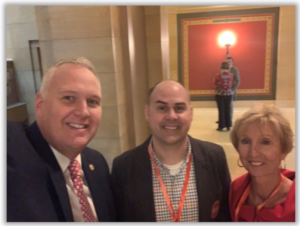
On Wednesday, March 11, I was able to catch up with Scott and Kathe from the Builders Association of Minnesota (BAM) while they were at the State Capitol for their Day on the Hill. BAM’s mission is to help their members excel in the Minnesota residential construction industry. They were able to share with me a current snapshot of the industry as well as a few of their top priorities for the 2020 legislative session with me.
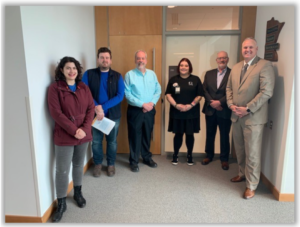 It was a pleasure to meet with a group of constituents who were participating in Disability Services Day on the Hill.
It was a pleasure to meet with a group of constituents who were participating in Disability Services Day on the Hill.
This is the MN Consortium for Citizens with Disabilities’ biggest advocacy day for the people with disabilities, their family members, allies, and professionals.
It was a great conversation to discuss legislation that promotes independence, choice, and inclusion for people with disabilities and their families.
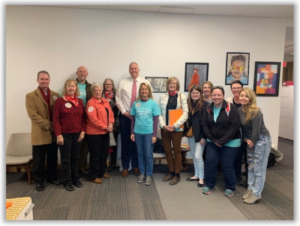
Senate District 44 was well represented for Wednesday’s Homeless Day on the Hill! Many of my friends who came to the see me at the Capitol last week have visited many times to advocate for affordable housing. It was great to visit and hear from them about the need for safe and affordable housing across our state.
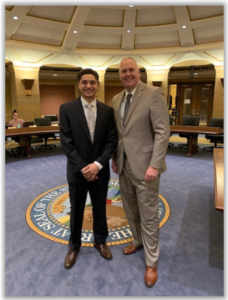
It was a real pleasure to meet Keeshawn, a Wayzata alumn and football captain,
and undergraduate student at the University of St. Thomas. Keeshawn was at the Capitol to testify in front of the Senate Higher Education Committee hearing on the benefits of the State Grant program. It was truly inspiring to hear his story and optimism about his future in commercial real estate.
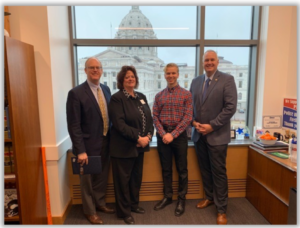
Constituents with the Associated Builders and Contractors stopped by last Thursday during their lobby day on the Hill to share their priorities for the session including: Promoting and protecting apprenticeships that work for union and non-union workers, and developing the next generation of the construction workforce. Promoting the healthy development of the construction marketplace, including outreach to minority communities, and fighting overreach in regulation and stopping unnecessary licensure.
Thanks for reading this week’s update. We are certainly in some unchartered waters as we deal with COVID-19 virus outbreak. Please follow the advice from the experts and continue following good viral prevention practices. Be prepared but don’t panic. Minnesotans are strong and resilient and I am confident we will deal with this challenge as we have others before.
We are all in this together.
As always, please reach out to my office if I can be helpful to you or your family.
You can reach my with your concerns and questions at 651-296-9261 or sen.paul.anderson@senate.mn.
Stay safe.
Sincerely,
Paul
